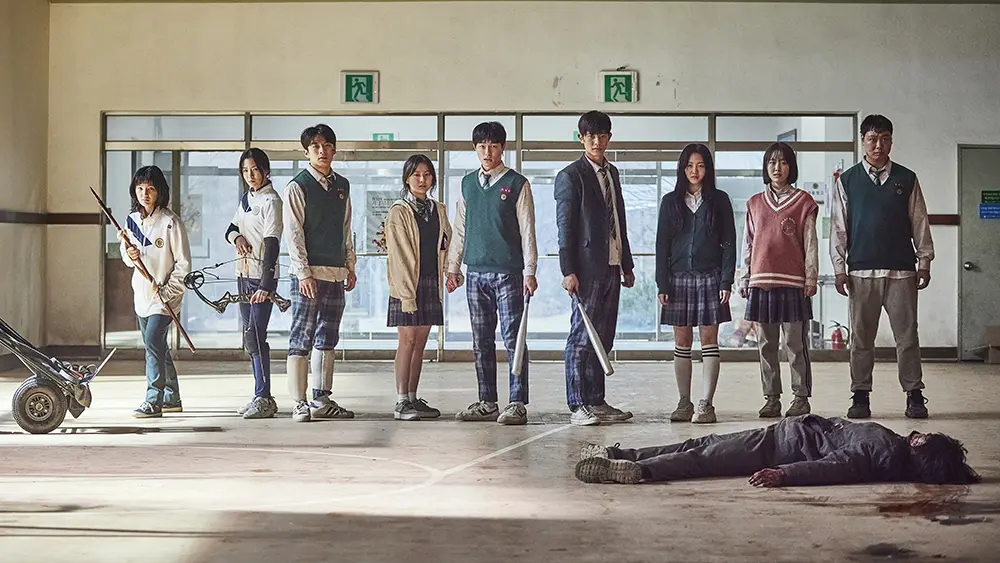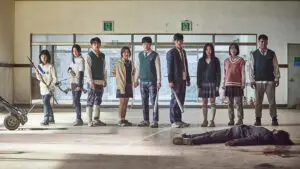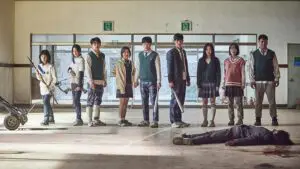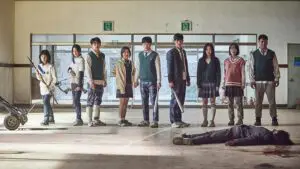Summary
All Of Us Are Dead might not have the instant meme-ability of Squid Game, but it’s another exciting k-drama with mainstream appeal that is sure to accumulate a sizeable audience on Netflix.
This review of All Of Us Are Dead is spoiler-free.
There are plenty of go-to settings for zombie apocalypses, from shopping malls and graveyards to – thanks to shows like The Walking Dead – farms, hospitals, and prisons. But the suburban high school feels fresh. That’s where Netflix’s new 12-part k-drama All of Us Are Dead chooses to unleash its undead plague, and it yields ripe results, from the predictable gore and carnage to a surprising amount of emotional heft and thematic punch. Some of these kids might deserve a grisly fate, and some might not, but they’re united by the fact that they all realize immediately that they’re in a zombie show.
That isn’t to say that there’s an obnoxious fourth-wall-breaking meta element at play here, just that there’s enough self-awareness to breathe some life into the living dead. The students at Hyosan High School reference Train to Busan as early as the second episode and make most of their decisions as if they’re in it – which, for all intents and purposes, they are. Since the unparalleled popularity of Squid Game let the wider world in on the secret that Korea a) exists and b) it has its own stellar film and TV output, more than usual will gravitate to this effort, perhaps without realizing that between the aforementioned Train to Busan, its sequel Peninsula, shows like Kingdom and films like #Alive (both also on Netflix), the nation has had the zombie-horror subgenre sewn up pretty tight for quite a while now.
Where All of Us Are Dead distinguishes itself is in its school setting, drawing direct parallels between a feral menace and ordinary high-school politics. The formation of its zombie-creating substance is inextricably linked to bullying, motivated by a desire to protect a loved one who can’t protect himself, but all of the drama that follows has some roots in the famously oppressive pressure-cooker environment of the Korean school and sporting systems. Adolescent anxieties are as much of a threat to life here as the so-called Jonas Virus, the brainchild of the school’s science teacher Mr. Lee, a noted genius who created the stuff to help his tortured son cope with his tormentors. It turns fear into rage and violence, and alive students into dead ones. If nothing else, this is a show that lives up to its title.
But there’s no complex overarching plot here. The virus is created, and Mr. Lee’s research vlogs are used as a narrative device to explain why and how it works, but the drama is rooted in survival. The first couple of episodes quickly assemble a ragtag team of students who hunker down and try to survive the outbreak, and then the show just relentlessly imperils them in one nail-biting set-piece after another. In the meantime, we get to know the key players, such as firefighter’s daughter On-jo, her loyal admirer Cheong-san, former bully and mean martial artist Su-hyeok, class president Nam-ra, and hulking Dae-su. As we go, more potential survivors are introduced, such as the well-intentioned English teacher Ms. Park and the archery team crack shot Jang Ha-ri. It’s an intriguing bunch, especially since the personal demons of each tend to become as dangerous as anything else. Even the inherent physicality or skillset of each student is smartly deployed in the frequent set-pieces.
But more crucially these feel like high school students. They continue to gossip, bitch, and backstab even in their most frantic moments, and the social hierarchy attempts to sustain itself even amongst complete societal collapse. The implication is clear – that even as the virus spreads beyond the boundaries of the school and into the wider world, it’s the result of festering ills and systemic injustices that have seeped from the top down. The rot is everywhere.
This strong thematic backbone gives All of Us Are Dead some real staying power, though whether or not its actual on-screen drama is able to sustain twelve long episodes is another matter entirely. Even the aforementioned Squid Game, which asked real questions about economic inequality, managed to tell a more or less complete story in fewer than ten. But All of Us Are Dead doesn’t linger on the points it’s making so much as the emotions that inform them; for many, the time it takes to emphasize the scraps of humanity that are able to sustain the dwindling survivors will be well worth the investment, especially since they lend a note of hopelessness to what is otherwise a bleak thesis. Even amongst all the carnage, death, and misery, this is a series that remains heartfelt and champions compassion and humanity above all. If it takes one or two too many episodes to get that point across, I don’t think we can complain.




